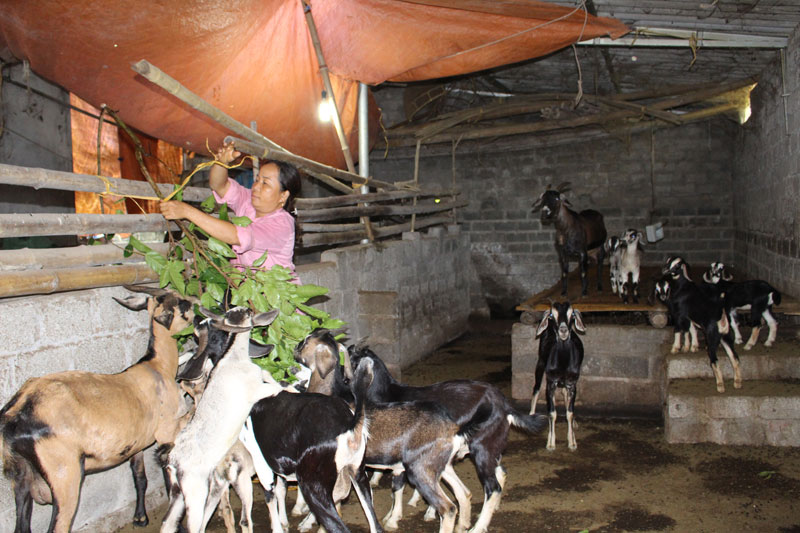
HBO – Through studying, people in Cao Duong commune (Luong Son district) recognized that the local climate and terrain are suitable for goat farming. Thus, a goat farming model has been implemented and expanded by locals. Goat farming brings in stable economic efficiency, helping many households escape from poverty.
Goat herb of Bui ThiHien’s family in
QuenThi village
At present,
Cao Duong commune is home to about 106 goat raising households with a total of
nearly 1,300 head. The breeders are seen in all villages but mostly in QuenThi
village, with 15 households. Among well-known goat breeders are Ha Van Dan and
Bui DinhChien in QuenThi village, Nguyen Van Tai and Bach Van Thin in Om Lang
village.
Bui DinhChien (QuenThi village) said that goat breeders must pay attention to
the animal’s characteristics. As goats like dryness and tidiness, their shelters
should be built in high, dry and cool places. Breeders must apply scientific
and technological advances in all stages, from shelter making to supervision
and management of goat herbs. To have healthy goat herbs, the first thing is to
select good breeding animals and clean up shelters regularly. Especially, feed
for goats must be kept dry to prevent themfrom getting stomachache. Goats have
high resistance so breeders only need to regularly worm and vaccinate them
against communicable diseases.
The goat consumption market is relatively stable. In some times, many
households had no goats for sale due to huge demand. With
the application of caring techniques and grasping of market demand, goat
farming is bringing in high economic efficiency, contributing to improving
living conditions of people in Cao Duong commune.
Bui Minh Bien, Chairman of the communal People’s Committee, said that to
develop and expand the goat farming, the committee has organised training
courses on a model toimprove local goat herbs using capital sources from the
agro-forestry promotion agency of Luong Son district. The commune implementsa policy
that the State pays 80 percent of money for purchasingmale goats while the
remaining 20 percent is covered by the breeder. In addition, it has also held
training courses on goat farming techniques, attracting more than 200 participants./.
Dao Village’s honey – a product certified with a 3-star OCOP (One Commune One Product) rating by Thong Nhat Agricultural Cooperative in Dao Village (Hoa Binh City) – is highly regarded by consumers for its quality, richness, and variety in packaging. The distinctively sweet taste of Dao Village’s honey leaves a lasting impression on anyone who has tried it.
In alignment with Project No. 07-DA/TU, issued by the Hoa Binh provincial Party Committee on November 1, 2021, Lac Thuy district has actively promoted investment and supported the sustainable development of its industrial and handicraft sectors during the 2021–2025 period. Alongside this, the district has remained committed to preserving and revitalising traditional craft villages.
Located in the northern part of Lac Thuy district, with a temperate climate and fertile soil, Phu Thanh commune has great potential and advantages in growing tea. The long-standing experience, combined with strict adherence to organic farming practices in the tea gardens, ensures that the dried tea products from Phu Thanh and Lac Thuy as a whole are sold out immediately upon production, providing a stable and prosperous life for the local people.
Amid efforts to streamline the administrative apparatus, Hoa Binh province has intensified measures to address challenges in land clearance, resettlement support, and infrastructure investment, aiming to speed up the progress of key projects.
Hoa Binh province has posted an unprecedented economic growth rate of 12.76% in the first quarter of 2025, marking its highest quarterly performance to date and positioning it as the second fastest-growing locality in the country, trailing only Bac Giang province.
Under current regulations, products in the One Commune – One Product (OCOP) programme that are rated three stars or higher must undergo re-evaluation every three months. However, in reality, some of these products fail to consistently meet the required standards, raising concerns about the sustainability of their OCOP certification. This underscores the urgent need for producers to enhance product quality and gradually develop their OCOP products into strong, marketable brands.



